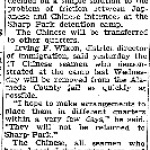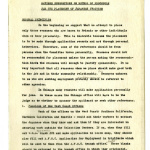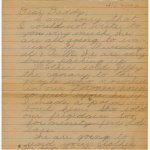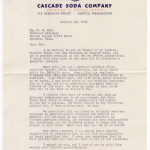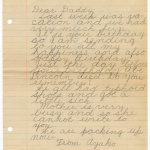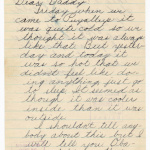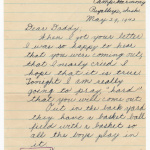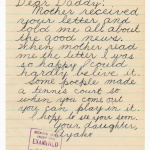Sharp Park (detention facility)
| US Gov Name | Sharp Park Detention Station |
|---|---|
| Facility Type | Immigration Detention Station |
| Administrative Agency | Immigration and Naturalization Service |
| Location | Sharp Park, California (37.6167 lat, -122.4667 lng) |
| Date Opened | March 30, 1942 |
| Date Closed | 1946 |
| Population Description | Held people of Japanese descent from California and Peru; also held German, Italian, and Chinese nationals |
| General Description | Located near Sharp Park in Northern California; set on a former state relief camp. |
| Peak Population | 379 (1942-07-14) |
| National Park Service Info | |
The Sharp Park Internment Camp was established to be a temporary holding station where enemy aliens were held. Alien Japanese were arrested hours after the bombing of Pearl Harbor and remained at Sharp Park for only a limited time before being sent to more permanent government prison-like facilities. The Sharp Park Internment Camp is now the home of the San Francisco Archery Club. The former enemy alien site is located near Sharp Park Road off Highway 1 and is located in a canyon next to the Sharp Park Golf Course in the City of Pacifica, California, which is located south of the City and County of San Francisco along the Pacific Ocean.
History of Sharp Park
Sharp Park is named after George F. Sharp who established the over 400-arce estate in 1849. Mr. Sharp died in October 1882 and when his wife, Honora Sharp, passed away on February 8, 1905, the estate was left to the City of San Francisco with specific instructions that the property be used for recreational functions.
Sharp Park is located in a canyon off Highway 1 in Pacifica, California, which is located about ten miles south of the San Francisco along the Pacific Ocean. Sharp Park came into existence in 1917, a golf course opened in 1931, and a boy's club/state relief camp was set up in the 1930s before the establishment of the internment camp in 1941. The state relief camp provided shelter, food, medical services, and employment for San Francisco's indigents. The Sharp Park Breakers reported that the San Francisco Board of Directors rejected the closing of Sharp Park, and it remained open as a camp for San Francisco's poor. [1] It is not clear when Sharp Park was transformed from an "older boys" camp to a state relief camp to an Immigration and Naturalization Service (INS) center. It does appear from an article in the Sharp Park Breakers that Sharp Park was an INS center in 1939 and controlled by the United States Army and INS. [2]
Sharp Park Internment Camp 1941-1946
Hours after the attack on Pearl Harbor, December 7, 1941, U.S. government agencies immediately implemented their clandestine plans for the incarceration of enemy aliens. The "enemy alien" label was placed on non-United States citizens of Japanese, German, and Italian ancestry. A number of predetermined internment sites were established in places such as Terminal Island, Tuna Canyon , and San Pedro in Southern California; and Angel Island and Sharp Park in Northern California.
On March 22, 1942, nine permanent alien enemy internment camps were built with an additional fourteen more camps erected that would be reserved for enemy alien internees and their families. [3] Camp Sharp Park, as it was then named, was an INS camp that held Japanese, German and Italian enemy alien men and a few alien women inmates. During the early months of 1942, the Sharp Park Internment Center became a processing center and was a minimum-security center. Additional barracks were built to increase capacity from 450 to 1,200, and at various times over 2,500 German, Italian, and Japanese internees would be imprisoned at Sharp Park Internment Center. Some Mexican and Canadian enemy aliens were housed there as well. [4]
The San Francisco News reported that 193 enemy aliens, mostly Japanese, were detained at Sharp Park to ease the overcrowding at the federal Immigration Station, in San Francisco. [5] The overcrowding condition occurred when Angel Island's Immigration Station Building burnt down in 1940 and when war was declared on the Axis Powers. The Sharp Park Internment Center was strongly guarded and the potentially dangerous group could be moved inland as soon as camps are opened up in the near future. Another article from the Sharp Park Breakers reported that Sharp Park was surrounded by "[10 foot high] cyclone fences of fine mesh" and "topped with barbed wire and floodlights to prevent escape attempts." [6]
Stanford instructor and Issei leader Yamato Ichihashi spent six weeks in Sharp Park. He wrote about the camp in his diary:
It [Sharp Park] is situated not far from Salada Beach in a beautiful valley which is surrounded by hills covered with green trees and shrubs; on the western side between low hills the Pacific Ocean is visible. The ground is limited by tall iron net-fences and small in area; barracks 20' x 120' are well-built and painted outside and inside and are regularly arranged; there are 10 of these for [?] inmates, each accommodating about 40, divided into 5 rooms for 8 persons each; if double-decked (beds), 80 can be put in. [7]
Ichihashi also reported:
[T]he number of detainees never exceeded 500; there are alien enemies – Japanese, German, and Italians, and 'Internationals,' mostly immigration cases. When I arrived there, the number was about 280, and when I left there on Oct. 26, there were only 145 men and 22 women or 167 in all, due to release or internment. However, the increase and diminution are not indicated by the number because new arrivals came during the period. [8]
The Issei were the first group of persons of Japanese ancestry to be imprisoned at various "temporary" locations such as Sharp Park prior to being sent to more permanent facilities. [9] The Issei were community leaders like businesspersons, clergy, language school teachers, and martial arts instructors. But in addition to these Japanese Americans, Japanese Latin Americans were also sent to the United States for internment. Like Japanese Americans, this was done without regard to their citizenship or to their legal status in their countries. On July 15, 1943, 119 Peruvian Japanese were sent to Sharp Park and would later be sent to Fort Missoula , Montana. Over fifteen Latin American countries capitulated to the U.S. demands and eventually deported a total of over 6,600 individuals of Japanese, German, and Italian ancestry, along with some of their families, to U.S. internment camps.
Sharp Park Internment Center was closed in 1946. Those few remaining German or Italian American prisoners were given the option to renounce their U.S. citizenship. A few did but later many of the renunciants regretted their decisions and fought to reverse them so they could remain in their homeland, the United States.
After the War
Towards the end of World War II, civilian proposals were being submitted for the redevelopment of the Sharp Park property. As reported from a local newspaper, the State of California Correction Department had made comments about opening a $1.2 million construction for "..... old boys [which would] hold up to 500 boys." There was public opposition as noted in the Sharp Park Breakers to such plans and the state decided not to locate a correctional faculty there. [10]
Today there does not appear to be any evidence of an internment campsite. But according to Jerry Crow of the Pacifica Historical Society, there are "remnants of the stonework between the old rifle range and the archery [club] range." [11] Also it's been reported that slabs of concrete foundations remain as well as a small green building that may be used for storage by the City of San Francisco but this author could not confirm these statements. [12] Also according to the Archery Club members, there is a garbage site that has not been disturbed due to the fact that it is covered with prison oak.
The only known surviving structure that was actually on the site but moved to its present location is a Quonset hut. The Pacifica Co-op Nursery School, a community day care center in Pacifica, currently uses the Quonset hut as their main classroom. Another Sharp Park Quonset hut was moved (date unknown) to Sonoma to be part of their new Boys Club but its current status is not known at this time. [13]
For More Information
Chang, Gordon H., ed. Morning Glory, Evening Shadow: Yamato Ichihashi and His Internment Writings, 1942-1945 . Stanford, CA: Stanford University Press, 1997.
Krammer, Arnold. Undue Process: The Untold Story of America's German Alien Internees . New York: Rowman and Littlefield Publishers, Inc., 1997.
Pacifica Historical Society. "Camp Sharp Park." https://pacificahistory.org/camp-sharp-park
Footnotes
- ↑ "Sharp Park Camp to stay for indigents," Sharp Park Breakers , June 21, 1941.
- ↑ Sharp Park Breakers , June 21, 1941.
- ↑ Arnold Krammer, Undue Process: The Untold Story of America's German Alien Internees (New York: Rowman and Littlefield Publishers, Inc, 1997), 83.
- ↑ Krammer, Undue Process , 26.
- ↑ San Francisco News , March 31, 1942.
- ↑ Sharp Park Breakers , April 3, 1942.
- ↑ Gordon H. Chang, ed., Morning Glory, Evening Shadow: Yamato Ichihashi and His Internment Writings, 1942-1945 (Stanford, CA: Stanford University Press, 1997), 152.
- ↑ Chang, Morning Glory , 152.
- ↑ Jeffery F. Burton, Mary M. Farrell, Florence B. Lord, and Richard W. Lord, Confinement and Ethnicity: An Overview of World War II Japanese American Relocation Sites (Western Archeological and Conservation Center, National Park Service, 1999, 2000), http://www.nps.gov/parkhistory/online_books/anthropology74/ce17a.htm .
- ↑ Sharp Park Breakers , June 27, 1945.
- ↑ Jerry Crow e-mail to author, Oct 1, 2006.
- ↑ Undated newspaper article from the file of the Pacifica Library.
- ↑ Undated newspaper article from the file of the Pacifica Library.
Last updated Jan. 16, 2024, 2:14 a.m..

